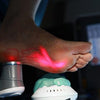Pinched Nerves: Causes, Symptoms, and Treatment

A pinched nerve, also known as nerve compression or nerve impingement, is a common and often painful issue caused by surrounding tissues such as bones, muscles, tendons, or cartilage compressing or irritating a nerve. The condition can affect people of all ages and cause a variety of troubling symptoms.
Pinched Nerves: An Overview
Nerves are vital components of the body's communication system, transporting electrical messages from the brain to various parts of the body. When a nerve is pinched or compressed, the usual flow of impulses is disrupted, resulting in a number of sensory and motor problems.
Pinched Nerve Causes
1. Disc Herniation: A herniated or bulging disc in the spine is one of the most prevalent causes of pinched nerves. When a disc protrudes and presses against a neighboring nerve, pain and discomfort can occur.
2. Bone Spurs: The formation of bony protrusions known as bone spurs over time can narrow the area around a nerve, causing compression.
3. Nerve Pathway Narrowing: Spinal stenosis and foraminal stenosis can reduce the space available for nerves to pass through, resulting in pinched nerves.
4. Injury or Trauma: Accidents or injuries, such as falls or sports-related occurrences, can cause nerve compression as a result of swelling or tissue displacement.
5. Repetitive Motion: Over time, repetitive actions or motions, particularly in the workplace, can cause nerve compression. Carpal tunnel syndrome is an example of this.
Arthritis: Inflammatory disorders such as rheumatoid arthritis or osteoarthritis can cause joint inflammation and, as a result, nerve compression.
Pregnancy: Weight gain and fluid retention during pregnancy can put strain on nerves, causing discomfort.
Pinched Nerve Symptoms
The symptoms of a pinched nerve might vary depending on where the compression is and how severe it is. Typical symptoms include:
1. Pain: The most prevalent symptom is localized pain, often described as sharp, burning, or radiating.
2. Numbness: Pins and needles or a numb sensation in the affected area.
3. Weakness: Muscle weakness or loss of coordination in the affected limb or body portion.
4. Tingling: A tingling feeling or "electric shocks" throughout the nerve pathway.
5. Radiating Pain: Pain may radiate along the nerve's route, reaching to different sections of the body.
6. Loss of Sensation: Sensitivity or sensory loss in the affected area.
Options for Pinched Nerve Treatment
Treatment for a pinched nerve is usually determined by the underlying cause, the severity of the symptoms, and the location of the afflicted nerve. Here are some commonly used techniques for treating pinched nerves:
1. Rest: The first step in treatment is frequently to rest the affected area and avoid activities that aggravate symptoms.
2. Physical Therapy: Specific exercises and stretches can be designed by physical therapists to reduce nerve compression and improve the muscles that support the afflicted area.
3. Nonsteroidal anti-inflammatory medications (NSAIDs) can help relieve pain and inflammation. Doctors may administer muscle relaxants or neuropathic pain medicines in some circumstances.
4. Steroid Injections: Corticosteroid injections straight into the afflicted area can reduce inflammation and offer relief.
5. Splints and Braces: A splint or brace may be encouraged to immobilize and support the affected area, depending on the location of the pinched nerve.
6. Ergonomic Adjustments: In cases of pinched nerves while at work, ergonomic modifications to workstations or instruments may be required to alleviate strain and prevent future occurrences.
7. Operation: When treatments fail or in severe circumstances, surgical intervention may be required to relieve nerve compression. This may entail the removal of bone spurs, the repair of herniated discs, or the decompression of the nerve route.
A pinched nerve can be a painful and bothersome ailment, but with the proper care and precautions, many cases can be effectively managed or prevented entirely. If you suspect a nerve being pinched, get immediate medical help because early diagnosis and treatment can avoid further issues. You may lower your risk of having pinched nerves and enjoy a life free of the discomfort they can cause by adopting excellent posture, living a healthy lifestyle, and being attentive of ergonomic concerns.





